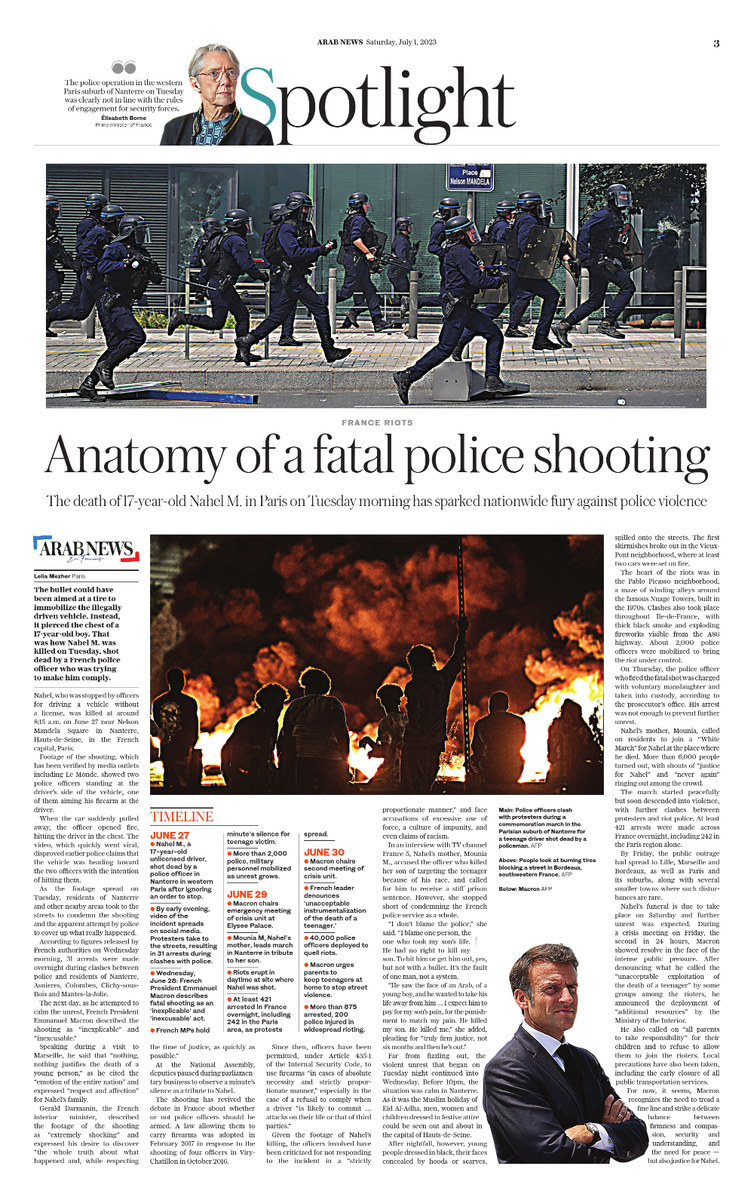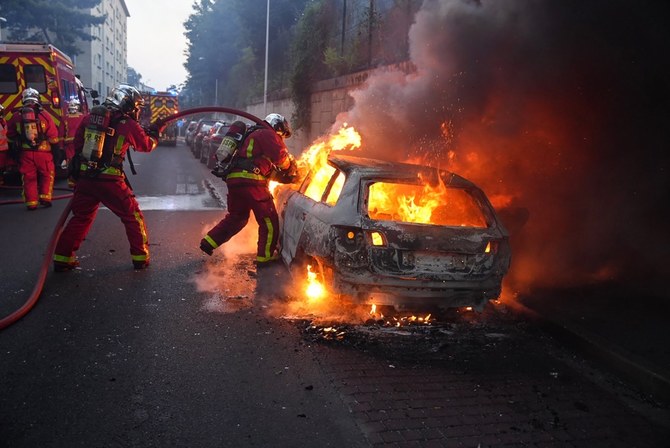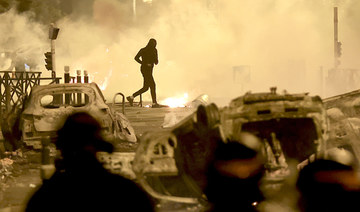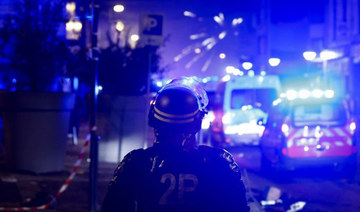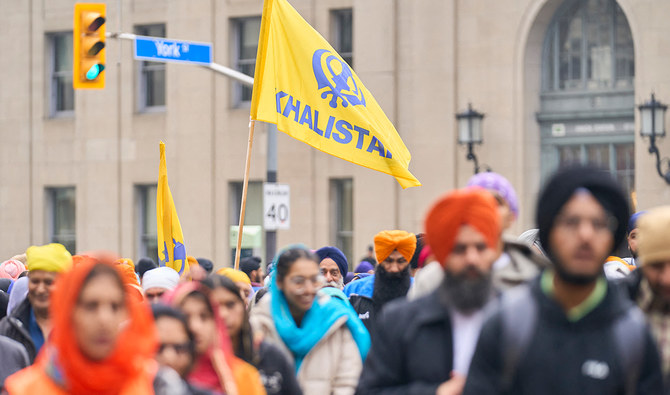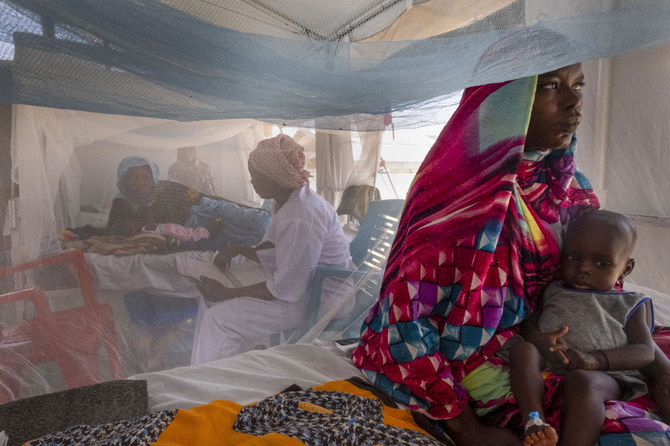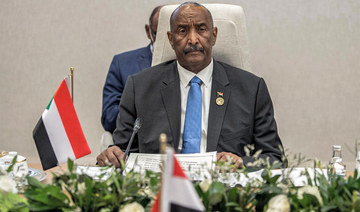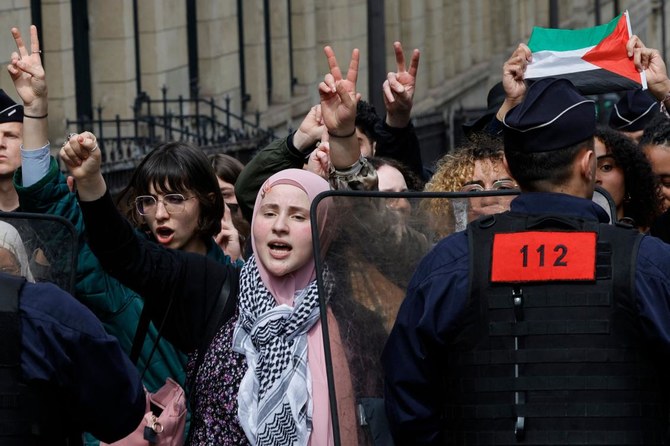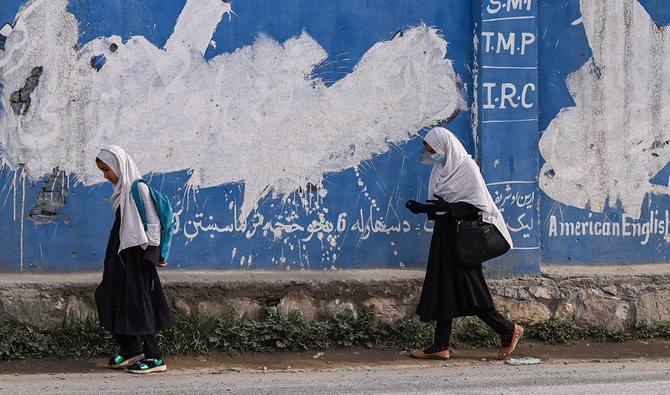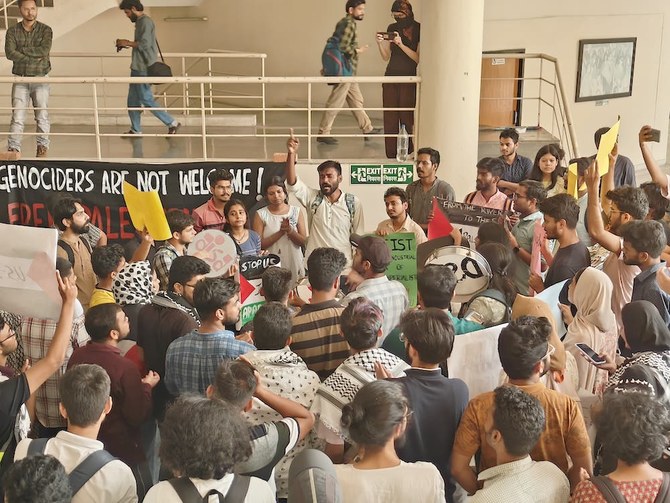PARIS: The bullet could have been aimed a tire to immobilize the illegally driven vehicle. Instead, it pierced the chest of a 17-year-old boy. That was how Nahel M. was killed on Tuesday, shot dead by a French police officer who was trying to make him comply.
Nahel, who was stopped by officers for driving a vehicle without a license, was killed at around 8:15 a.m. on June 27 near Nelson Mandela Square in Nanterre, Hauts-de-Seine, in the French capital, Paris.
His mother, Mounia M., a healthcare professional, said she said goodbye to her son that morning to go to work, the same as any other day. “We left at the same time,” she told the French media.
Footage of the shooting, which has been verified by media outlets including Le Monde, showed two police officers standing at the driver’s side of the vehicle, one of them aiming his firearm at the driver.
When the car suddenly pulled away, the officer opened fire, hitting the driver in the chest. The video, which quickly went viral, disproved earlier police claims that the vehicle was heading toward the two officers with the intention of hitting them.
As the footage spread on Tuesday, residents of Nanterre and other nearby areas took to the streets to condemn the shooting and the apparent attempt by police to cover up what really happened.
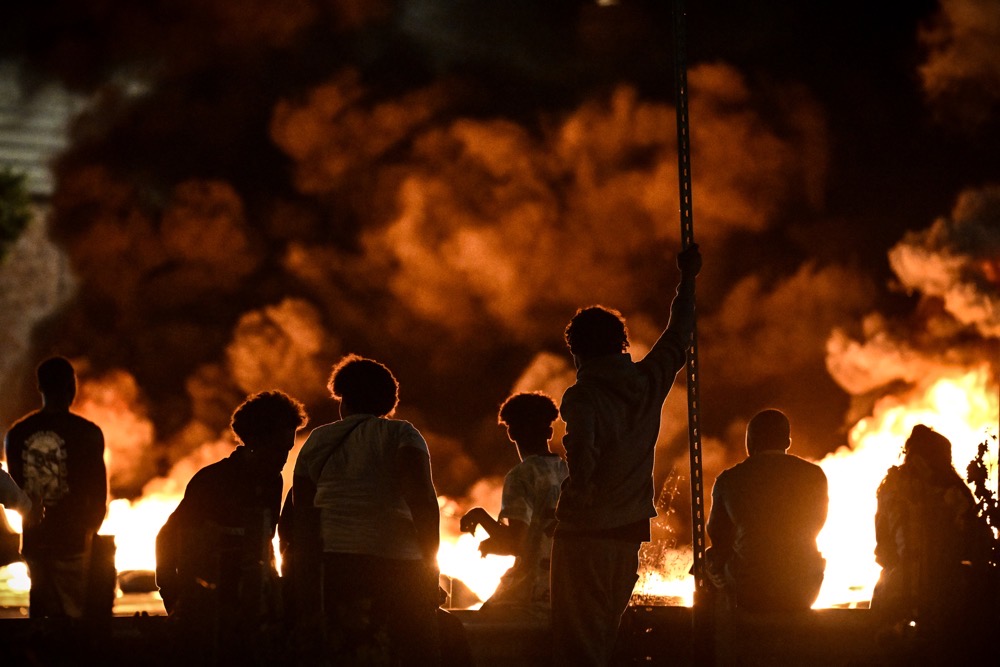
Youth watch a street with burning tyres in Bordeaux, south-western France. (AFP)
According to a figures released by French authorities on Wednesday morning, 31 arrests were made overnight during clashes between police and residents of Nanterre, Asnieres, Colombes, Clichy-sous-Bois and Mantes-la-Jolie.
The next day, as he attempted to calm the unrest, French President Emmanuel Macron described the shooting as “inexplicable” and “inexcusable.”
Speaking during a visit to Marseille, he said that “nothing, nothing justifies the death of a young person,” as he cited the “emotion of the entire nation” and expressed “respect and affection” for Nahel’s family.
Gerald Darmanin, the French interior minister, described the footage of the shooting as “extremely shocking” and expressed his desire to discover “the whole truth about what happened and, while respecting the time of justice, as quickly as possible.”
At the National Assembly, deputies paused during parliamentary business to observe a minute’s silence as a tribute to Nahel.
The shooting has revived the debate in France about whether or not police officers should be armed. A law allowing them to carry firearms was adopted in February 2017 in response to the shooting of four officers in Viry-Chatillon in October 2016.
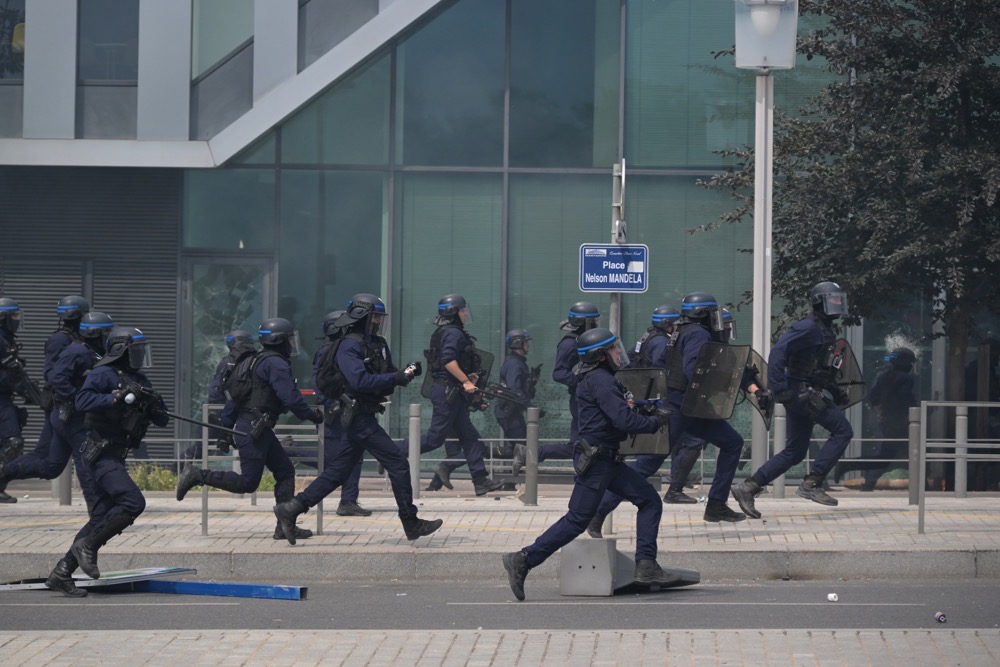
Police officers clash with protesters in the Parisian suburb of Nanterre. (AFP)
Since then, officers have been permitted, under Article 435-1 of the Internal Security Code, to use firearms “in cases of absolute necessity and strictly proportionate manner,” especially in the case of a refusal to comply when a driver “is likely to commit … attacks on their life or that of third parties.”
Given the footage of Nahel’s killing, the officers involved have been criticized for not responding to the incident in a “strictly proportionate manner,” and face accusations of excessive use of force, a culture of impunity, and even claims of racism.
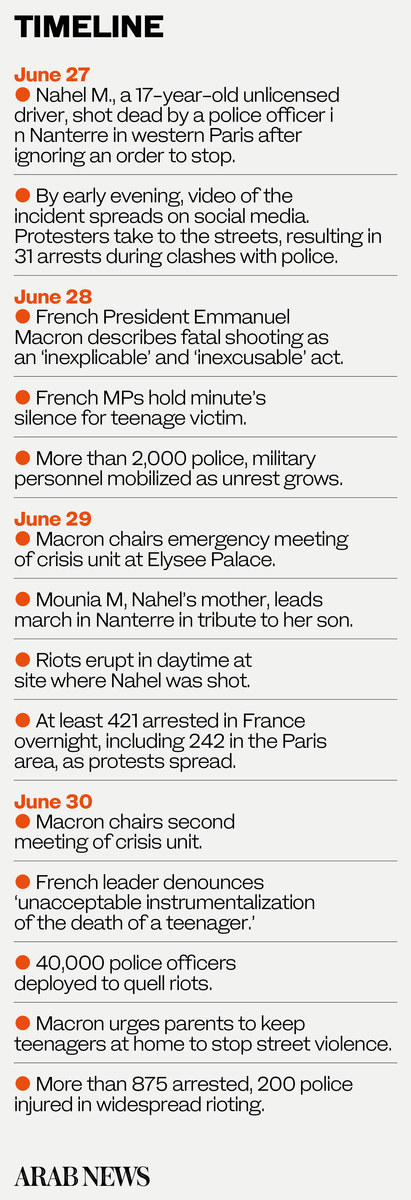 In an interview with TV channel France 5, Nahel’s mother, Mounia, accused the officer who killed her son of targeting the teenager because of his race, and called for him to receive a stiff prison sentence. However, she stopped short of condemning the French police service as a whole.
In an interview with TV channel France 5, Nahel’s mother, Mounia, accused the officer who killed her son of targeting the teenager because of his race, and called for him to receive a stiff prison sentence. However, she stopped short of condemning the French police service as a whole.
“I don’t blame the police,” she said. “I blame one person, the one who took my son’s life. He had no right to kill my son. To hit him or get him out, yes, but not with a bullet. It’s the fault of one man, not a system.
“He saw the face of an Arab, of a young boy, and he wanted to take his life away from him … I expect him to pay for my son’s pain, for the punishment to match my pain. He killed my son. He killed me,” she added, pleading for “truly firm justice, not six months and then he’s out.”
Several public figures, including Marseille-based rap artists Jul and SCH, reacted to Nahel’s death on social media. On Wednesday, SCH tweeted his “full support” for Nahel’s loved ones and “our neighborhoods.”
Rohff, also a rapper, tweeted: “Lack of a license or a refusal to comply should not allow a police officer who is not in danger to commit murder in public.”
On Wednesday morning, Kylian Mbappe, the captain of the French national football team, expressed his anger, describing the incident as “unacceptable.”
In a message posted on Twitter, he wrote: “My heart aches for my France.”
French actor Omar Sy, star of the Netflix TV series “Lupin,” tweeted: “My thoughts and prayers go out to the family and loved ones of Nahel, who died at 17 … killed by a police officer in Nanterre. May a proper justice honor the memory of this child.”
Far from fizzling out, the violent unrest that began on Tuesday night continued into Wednesday. Before 10pm, the situation was calm in Nanterre. As it was the Muslim holiday of Eid Al-Adha, men, women and children dressed in festive attire could be seen out and about in the capital of Hauts-de-Seine.
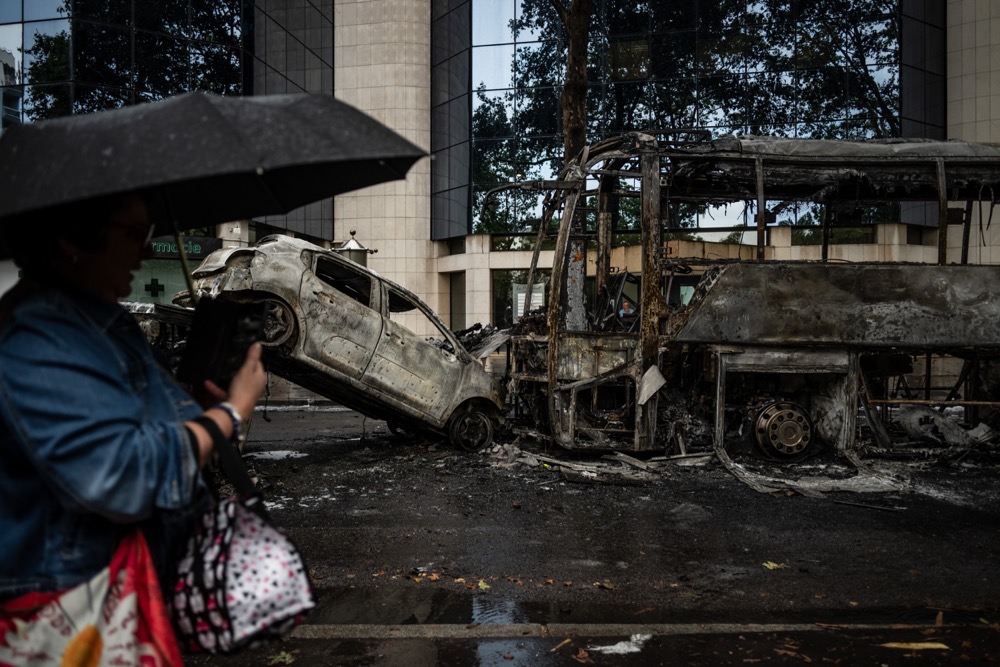
A pedestrian takes an image as she walks by burnt vehicles on a street in Lyon, south-eastern France. (AFP)
After nightfall, however, young people dressed in black, their faces concealed by hoods or scarves, spilled onto the streets. The first skirmishes broke out in the Vieux-Pont neighborhood, where at least two cars were set on fire.
The heart of the riots was in the Pablo Picasso neighborhood, a maze of winding alleys around the famous Nuage Towers, built in the 1970s. Clashes also took place throughout Ile-de-France, with thick black smoke and exploding fireworks visible from the A86 highway. About 2,000 police officers were mobilized to bring the riot under control.
On Thursday, the police officer who fired the fatal shot was charged with voluntary manslaughter and taken into custody, according to the prosecutor’s office. His arrest was not enough to prevent further unrest.
Nahel’s mother, Mounia, called on residents to join a “White March” for Nahel at the place where he died. More than 6,000 people turned out, with shouts of “justice for Nahel” and “never again” ringing out among the crowd.
The march started peacefully but soon descended into violence, with further clashes between protesters and riot police. At least 421 arrests were made across France overnight, including 242 in the Paris region alone.
By Friday, the public outrage had spread to Lille, Marseille and Bordeaux, as well as Paris and its suburbs, along with several smaller towns where such disturbances are rare, including Denain near Roubaix, a town of about 20,000 inhabitants. There were violent clashes and major acts of vandalism in all these places.
Yannick Landraud, a union representative for Police Alliance 75, said that protesters had fired projectiles at riot police “from close range,” injuring several officers.
Although there is growing support for a more robust crackdown on the rioters, Landraud cautioned against declaring a state of emergency too soon on the grounds that it might not be respected and could give the impression the state had failed.
“And what will come next?” he asked. “It won’t stop. They are in a pattern where they will gather every night … To what level of violence will we escalate?”
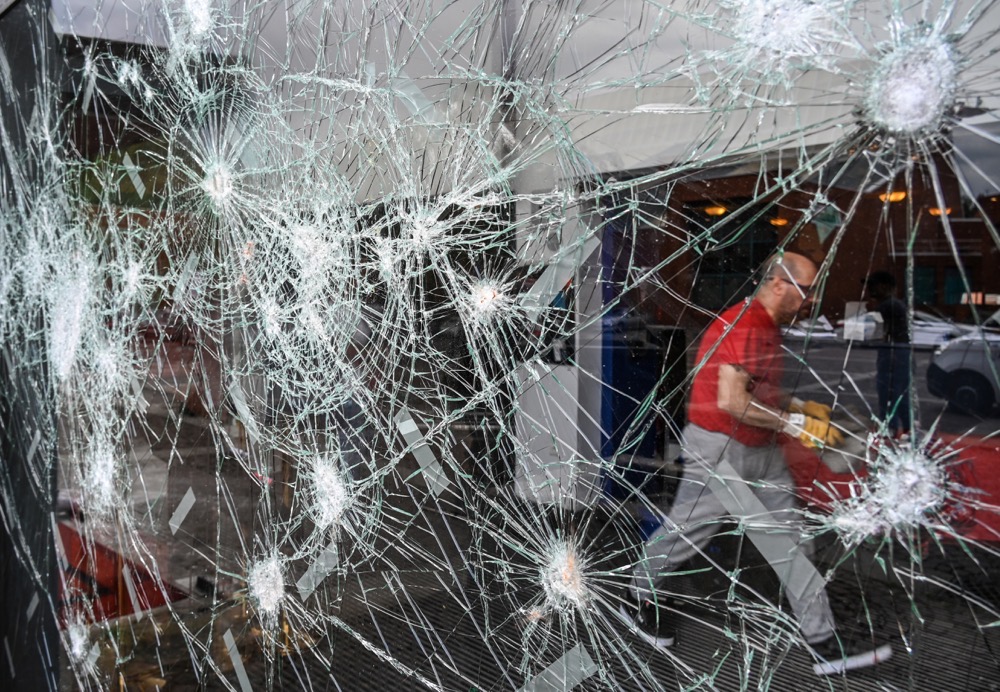
A municipal employee walks past broken windows of The Coliseum of Roubaix Theatre in Roubaix, northern France. (AFP)
Nahel’s funeral is due to take place on Saturday and further unrest was expected. During a crisis meeting on Friday, the second in 24 hours, Macron showed resolve in the face of the intense public pressure. After denouncing what he called the “unacceptable exploitation of the death of a teenager” by some groups among the rioters, he announced the deployment of “additional resources” by the Ministry of the Interior.
He also called on “all parents to take responsibility” for their children and to refuse to allow them to join the rioters. Local precautions have also been taken, including the early closure of all public transportation services.
For now, it seems, Macron recognizes the need to tread a fine line and strike a delicate balance between firmness and compassion, security and understanding, and the need for peace — but also justice for Nahel.
